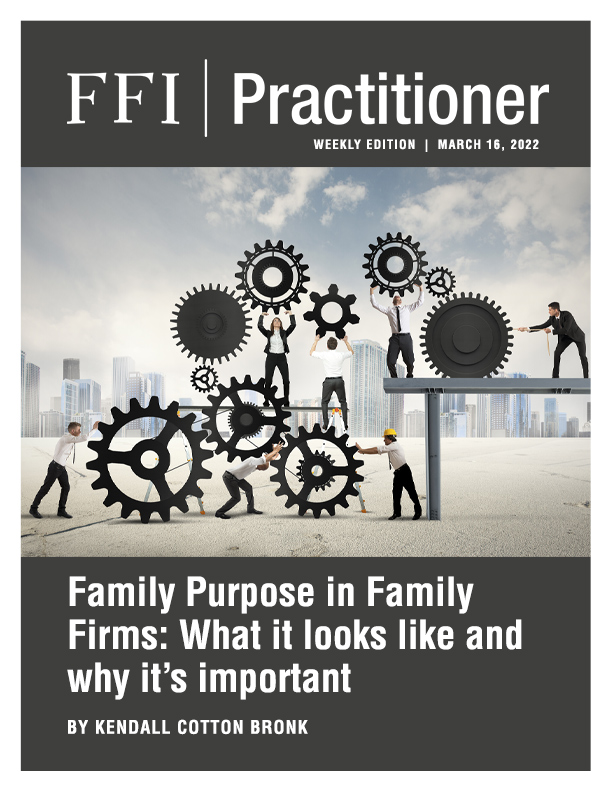
Family firms share the need for corporate purpose, but family firms face particular opportunities and challenges in cultivating purpose among the family members who participate in the family business. The Family Purpose Project, a recent multinational study2 led by Kendall Cotton Bronk (Claremont Graduate University), Tarek el Sehity (Sigmund Freud University), Heinrich Liechtenstein (IESE), and William Damon (Stanford University), examined the nature of family purpose in well-established family enterprises. The research explored whether a family purpose plays a consequential role in helping families achieve their business goals and in enabling family enterprises to serve the public good.
In whatever way they have used the concept of family purpose, researchers and family advisors have pointed to its promise. Advisors have argued that it can help businesses adapt to change, assist in efforts to educate and prepare younger generations for leadership, and enable business families to contribute to their communities.3,4 Some have suggested that families should consciously and intentionally reflect on the things that matter most to them so that they can determine how to use their resources meaningfully5 and can arrive at a consensus regarding why they want to remain together.6 Some have gone so far as to claim that family purpose is the most effective practice for ensuring long-term family business growth.7
Despite this growing consensus that family purpose can play a key role in enabling business families to achieve their corporate and public goals, not enough is known about what constitutes a real family purpose or about what one looks like in action. Empirical research on the topic is limited. The goals of The Family Purpose Project were to create a clear and consistent definition of family purpose that can enable more effective practice, to identify the forms that family purpose may take, and to determine how family purpose may be cultivated across generations of business families.
Sidebar

Family Purpose Defined
In consultation with family advisors, business families, and family business researchers, The Family Purpose Project proposed a definition that guided the researchers’ investigation of the construct: family purpose is a long-term goal that families share across generations and that becomes meaningful to younger generations of family members as they form their own plans to accomplish acts of consequence to the world beyond themselves.
There are five key dimensions of this definition:
- The pursuit of collective, family purpose represents a long-term intention. Although a family’s purpose is likely to evolve over time, it manifests as a thread of consistent focus and vision that extends across time and generations.
- A family purpose is meaningful to members of the family. It matters to them. Rather than merely talking about it, family purpose is so important to family members that they actively engage in making progress toward it.
- A family’s purpose is reflected in the family’s history, present activities, and future plans. The family’s purpose is consistent with the family’s actions over time.
- A family purpose is oriented toward a cause beyond the family. Families may use their shared businesses as vehicles for purpose or they may use the proceeds from their businesses to support causes they value. In both cases, the target of the family’s intention resides beyond the family.
- A family purpose is shared by members of the extended family. This does not mean that every family member actively supports the purpose—in large families with more than 100 or even 1,000 members, this would be unlikely—but it does mean that most family members recognize the aim as a significant and meaningful vision for the family.

Forms of Family Purpose
Over the past three years, the Family Purpose Project has conducted interviews with 91 members of 26 business families. The researchers tried to interview at least three members of three different generations within each family. From these interviews, four distinct forms or statuses of family purpose emerged.
Nearly half of the families interviewed demonstrated a clear sense of family purpose, meaning they demonstrated all five definitional criteria. One such family was a family of real estate developers. In addition to their real estate business, they also oversaw a large family foundation. According to one of the family members, the family’s shared purpose centered on “being a force for good,” meaning the family sought to run its business in a highly ethical manner. Members of the family referenced this objective when making significant business decisions. It also meant the family consistently and generously engaged in philanthropic activities aligned with their business aims. For example, they supported “green” building practices. Notably, religious values provided an important foundation for the family’s shared purpose.
Conclusion
In addition to defining the concept of family purpose in a rigorous way and identifying the various forms that family purposes may take, the interviews also suggested that families with shared purpose have a strong motivation to stay together. Families with purpose tend to be particularly close. Although all the families with purpose in our study were cohesive, not all cohesive families demonstrate purpose. Family cohesion appears to be a necessary but insufficient prerequisite to family purpose. However, it was not surprising that families with purpose were close. Cohesive families likely find it easier than disconnected ones to maintain shared commitments, and families whose members share and engage with a central, meaningful aim are likely to feel closely connected to one another. In short, developing a family purpose likely provides important benefits to the family, the family business, and the public that the family business serves.
References
1 Ernst & Young (December 15, 2020). What is purpose and why do we need it? Accessed online 3 March 2022. https://www.ey.com/en_us/purpose/why-business-must-harness-the-power-of-purpose.
2 The Family Purpose Project is a three-year research study generously funded by the John Templeton Foundation and led by Kendall Cotton Bronk (Principal Investigator, Claremont Graduate University), Tarek el Sehity (Co-Principal Investigator, Sigmund Freud University), Heinrich Liechtenstein (IESE), and William Damon (Stanford University). For more information about the study, please contact Professor Bronk via email (kcbronk@cgu.edu).
3 Jaffe, D. (2020). Borrowed from your grandchildren: The evolution of the 100-year family enterprises. Wiley.
4 Jaffe, D. T. & Lane, S. H. (2004). Sustaining a family dynasty: Key issues facing complex multigenerational busines- and investment-owning families. Family Business Review, 17(1), 81-98.
5 Schervish, P. G. (Spring, 2005). Creating a moral biography of wealth. The Whitepapers: Quarterly intelligence for informed investors. The Private Banking and Investment Group at Merrill Lynch.
6 Jaffe, D. T. & Lane, S. H. (2004).
7 Ward, J. L. (1997). Growing the family business: Special challenges and best practices. Family Business Review, 10(4), 323-337.

